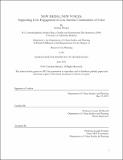| dc.contributor.advisor | Ceasar McDowell. | en_US |
| dc.contributor.author | Ritoper, Stefanie (Stefanie Tianne) | en_US |
| dc.contributor.other | Massachusetts Institute of Technology. Dept. of Urban Studies and Planning. | en_US |
| dc.date.accessioned | 2011-11-18T21:18:14Z | |
| dc.date.available | 2011-11-18T21:18:14Z | |
| dc.date.copyright | 2011 | en_US |
| dc.date.issued | 2011 | en_US |
| dc.identifier.uri | http://hdl.handle.net/1721.1/67237 | |
| dc.description | Thesis (M.C.P.)--Massachusetts Institute of Technology, Dept. of Urban Studies and Planning, 2011. | en_US |
| dc.description | Cataloged from PDF version of thesis. | en_US |
| dc.description | Includes bibliographical references (p. 114-116). | en_US |
| dc.description.abstract | Within the past few years, large-scale events such as Obama's successful 2008 campaign and democratic mobilizations in the Middle East have increased mainstream buzz about the democratic potential of new media. With the spectrum of digital access shifting, particularly with increasing mobile phones access, new possibilities are emerging for marginalized communities to increase their say in public processes. Many across governmental, private and nonprofit sectors are starting to experiment with using new media tools as a means for civic engagement. However, will building new platforms be enough to increase civic engagement in marginalized communities, particularly low-income communities of color? This thesis analyzes the experience of the North End Organizing Network (NEON), based in Springfield, Massachusetts, as it pilots a mobile technology tool to engage residents. It focuses on community-based organizations as key actors in increasing digital access. The research begins by examining the literature, finding a gap in scholarship on new media technology and civic engagement in low-income communities of color. The thesis then analyzes five supporting cases for salient themes as an analytical framework: Louisiana Bucket Brigade, Institute for Popular Education of Southern California (IDEPSCA), Voices of Community Activists and Leaders (VOCAL), DREAM Team Los Angeles and Families for Freedom. The analysis reveals that some keys to success include a flexible approach, playing to the strengths of multiple co-existing platforms and involving community members in technology decision-making. NEON, the primary case, underwent a five-month pilot process to design and test a mobile technology tool for residents to submit text messages and voicemails its Question Campaign. The research suggests that when the rubber hits the road, deeply engaging residents using new media tools is not easy. It requires significant time investment up front, particularly in the context of multiple co-existing communication channels. The research argues that institutions should create thoughtful strategies that intentionally target and involve users on the margin to tap the massive potential of new media for low-income residents. | en_US |
| dc.description.statementofresponsibility | by Stefanie Ritoper. | en_US |
| dc.format.extent | 116 p. | en_US |
| dc.language.iso | eng | en_US |
| dc.publisher | Massachusetts Institute of Technology | en_US |
| dc.rights | M.I.T. theses are protected by
copyright. They may be viewed from this source for any purpose, but
reproduction or distribution in any format is prohibited without written
permission. See provided URL for inquiries about permission. | en_US |
| dc.rights.uri | http://dspace.mit.edu/handle/1721.1/7582 | en_US |
| dc.subject | Urban Studies and Planning. | en_US |
| dc.title | New Media, new voices : supporting civic engagement in low-income communities of color | en_US |
| dc.title.alternative | Supporting civic engagement in low-income communities of color | en_US |
| dc.type | Thesis | en_US |
| dc.description.degree | M.C.P. | en_US |
| dc.contributor.department | Massachusetts Institute of Technology. Department of Urban Studies and Planning | |
| dc.identifier.oclc | 759122725 | en_US |
